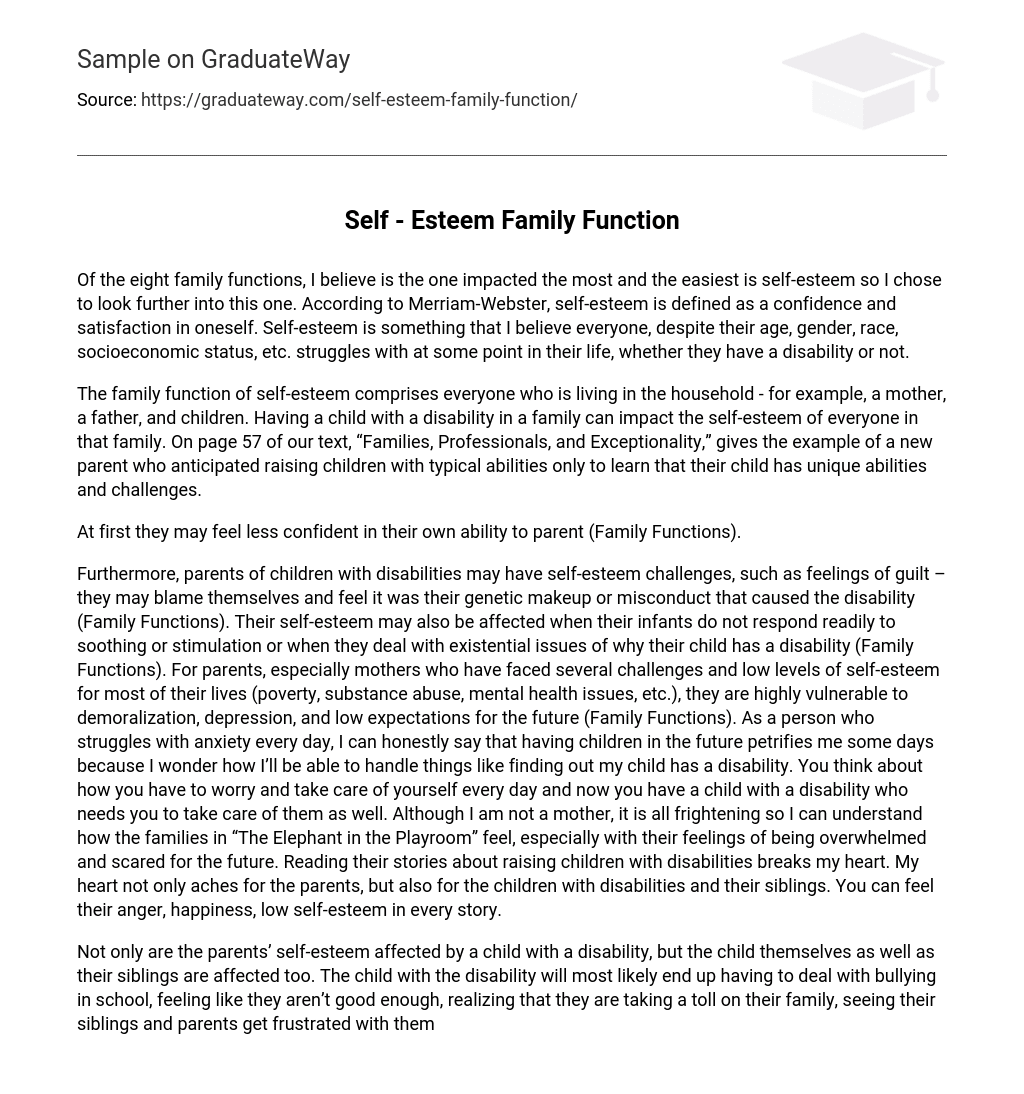Of the eight family functions, I believe is the one impacted the most and the easiest is self-esteem so I chose to look further into this one. According to Merriam-Webster, self-esteem is defined as a confidence and satisfaction in oneself. Self-esteem is something that I believe everyone, despite their age, gender, race, socioeconomic status, etc. struggles with at some point in their life, whether they have a disability or not.
The family function of self-esteem comprises everyone who is living in the household – for example, a mother, a father, and children. Having a child with a disability in a family can impact the self-esteem of everyone in that family. On page 57 of our text, “Families, Professionals, and Exceptionality,” gives the example of a new parent who anticipated raising children with typical abilities only to learn that their child has unique abilities and challenges.
At first they may feel less confident in their own ability to parent (Family Functions).
Furthermore, parents of children with disabilities may have self-esteem challenges, such as feelings of guilt – they may blame themselves and feel it was their genetic makeup or misconduct that caused the disability (Family Functions). Their self-esteem may also be affected when their infants do not respond readily to soothing or stimulation or when they deal with existential issues of why their child has a disability (Family Functions). For parents, especially mothers who have faced several challenges and low levels of self-esteem for most of their lives (poverty, substance abuse, mental health issues, etc.), they are highly vulnerable to demoralization, depression, and low expectations for the future (Family Functions). As a person who struggles with anxiety every day, I can honestly say that having children in the future petrifies me some days because I wonder how I’ll be able to handle things like finding out my child has a disability. You think about how you have to worry and take care of yourself every day and now you have a child with a disability who needs you to take care of them as well. Although I am not a mother, it is all frightening so I can understand how the families in “The Elephant in the Playroom” feel, especially with their feelings of being overwhelmed and scared for the future. Reading their stories about raising children with disabilities breaks my heart. My heart not only aches for the parents, but also for the children with disabilities and their siblings. You can feel their anger, happiness, low self-esteem in every story.
Not only are the parents’ self-esteem affected by a child with a disability, but the child themselves as well as their siblings are affected too. The child with the disability will most likely end up having to deal with bullying in school, feeling like they aren’t good enough, realizing that they are taking a toll on their family, seeing their siblings and parents get frustrated with them at times, etc. All of these things can add up and take a toll on the child – it is up to the parents to ensure that their child knows they are loved and that their disability doesn’t own them but that they own their disability. On the other hand, the sibling has to feel left out or unloved because his/her parents are giving all the attention and support to their sibling., as well as feeling that they have to advocate for their sibling when their parents aren’t around. It is also up to the parents to ensure that their other children know how loved they are, that their sibling isn’t getting all of the attention and support and that they don’t have to advocate for their sibling.
From working in an aftercare program to having my own classroom, I can absolutely see the differences in children when there is a sibling with a disability. For example, there are twin girls in Kindergarten in my school. One of the twins has hearing loss and just got hearing aids. The little girl was so excited and was showing them off to everyone; she was very proud of them. Her sister, on the other hand, just kind of stands back and lets her sister bask in all the glory, almost as if she’s in the background and no one notices her. I also have a student in my class who has a speech disability. He gets speech twice a week, and while he is in my class I try as much as I can to get him to talk and be descriptive about what he’s talking about. His sister is in Kindergarten, and whenever she is around, she will advocate for him, talk for him, and treat him as if she’s the mom. I can’t be 100% sure, but I feel as if their mom is having her do advocate for him so that other children don’t misunderstand him or say anything about his speech problem.
Self-esteem is very tricky and can affect every person in the family of a child with disabilities. It may not always be easy and there may be more bad times than good, but families have to remember that their child creates a family bond, not their disability. Good or bad, in happy times or in sad or angry, they are one family unit that sticks together through it all.





